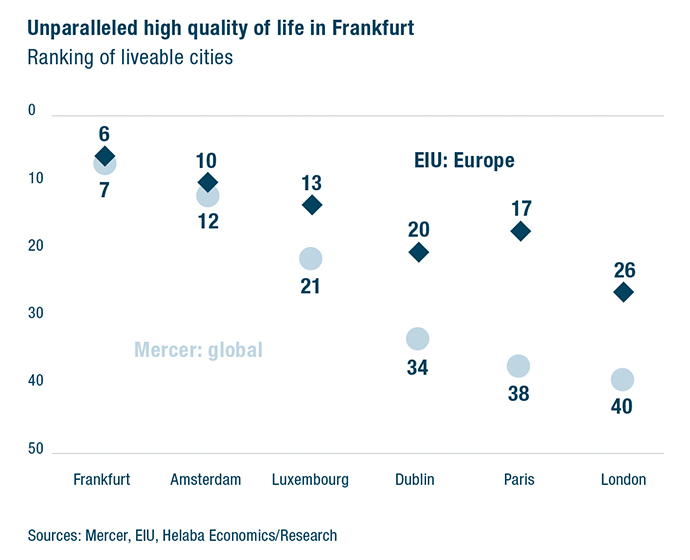Handicapping the race to become “the next London” — i.e. the post-Brexit capital of European finance — is a lot like trying to guess the winner of soccer’s World Cup: In every conversation, the Germans come up. Will the new London be Frankfurt or Paris? Dublin or Frankfurt? Frankfurt or Luxembourg? Amsterdam or Frankfurt?

As Germany’s unquestioned center of finance — home to the European Central Bank, among other German and global financial institutions — Frankfurt is well positioned in the race to win London’s shrinking global banking business ahead of the UK’s departure from the European Union in March 2019. Pending agreements on post-Brexit relations between the UK and Europe, the UK seems likely to lose its “financial passport,” a legal instrument that lets banks transfer money among EU member states. Post-Brexit, banking in the EU will mean banking from somewhere other than London.
Germany’s Deutsche Bank, for one, plans to start moving several thousand workers from London to Frankfurt as soon as next year. In a recent speech, Deutsche Bank CEO John Cryan called Frankfurt the top contender.
“Jobs will be created in cities like Dublin, Amsterdam or Paris,” said Cryan. “But none of those locations have the structures to really take over a substantial part of the business in London. The only European city that meets these preconditions is Frankfurt.”
A Bonanza of Banking Jobs
Brussels-based Breugel, an influential think tank, predicts the UK could lose 30,000 financial services jobs. Frankfurt Main Finance, a public-private lobbying group that’s leading the city’s charge, foresees an influx of 10,000 financial services staff from London, with associated job creation of more than 87,000 new positions throughout the Rhein-Main region. “The job growth will further advance the economic strength of Frankfurt,” says Hubertus Vaeth, Frankfurt Main Finance’s managing director.
A German official tells Site Selection that 15 banks already have committed to relocate staff to the city. They include UBS, Goldman Sachs, JP Morgan, Morgan Stanley and Citigroup. Korean banking giant Woori has said it plans to apply for a German banking license, as have Japan’s Nomura, Daiwa, and Sumitomo investment banks.
Making the Pitch
German officials insist they’d prefer the Brexit vote hadn’t happened, and that the UK’s scheduled departure is a losing proposition for all. That’s not to say they haven’t been aggressive in courting London’s banking business.
Oliver Beil, senior manager of investor services for Hessen Trade and Invest, touts the Frankfurt area’s critical mass of institutions, 11-percent office vacancy rate and moderate costs compared to London or Paris. “Tax cuts and other incentives are not on the table right now, and probably won’t be,” he says. Still, German officials have floated the idea of introducing legislation to relax Germany’s strict labor protection laws in hopes of easing banks’ fears of being unable to cut staff during economic downturns without burdensome penalties.
Germany’s federal government also has applied to the EU to inherit the HQ of the European Banking Authority, which will have to leave London. Chancellor Merkel boasted that Frankfurt, as a “proper” financial center already, is “pre-destined” to add the authority to its brimming roster of regulators. Cheekier still, Hubertus Vaeth of Frankfurt Main Finance recently took a public swipe at Paris, widely viewed as Frankfurt’s top rival in the banking sweepstakes, telling The Globe and Mail that the French capital “is the city of light, the city of love, and a city of lunch.
“In finance,” he added, “lunch is for losers.”

